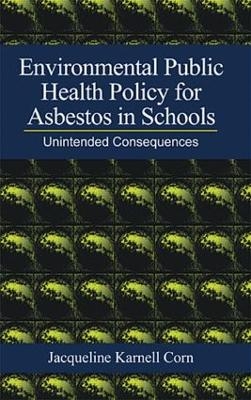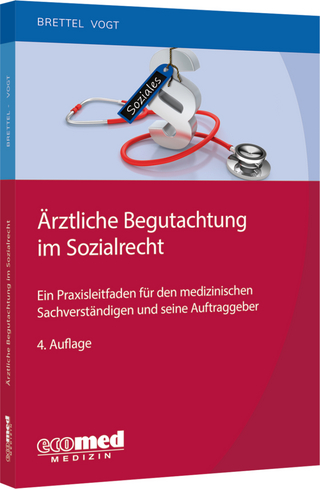
Environmental Public Health Policy for Asbestos in Schools
Unintended Consequences
Seiten
1999
Crc Press Inc (Verlag)
978-1-56670-488-5 (ISBN)
Crc Press Inc (Verlag)
978-1-56670-488-5 (ISBN)
- Titel ist leider vergriffen;
keine Neuauflage - Artikel merken
Focuses on the development, institutionalization, and consequences of federal environmental policy for asbestos in schools. This book explores the history of asbestos in schools and buildings and how this issue shaped the development of public health policy.
On January 3, 1977, Howell Township, New Jersey closed its schools while scientists tested for dangerous levels of asbestos. After reports of unexplained ailments in some children, the parents of 4,500 elementary school children had threatened to boycott classes until the Board of Education removed asbestos-containing materials. Similar cases occurred across the country. In February, 1977, the New York Times reported that the child whose illness had been attributed to asbestos actually had mononucleosis.
Was the reaction of parents and officials unwarranted? Did scientific evidence exist indicating that asbestos in schools caused children to become ill? Was all the relevant information - including the impact of their decisions on public policy in the future - considered? Environmental Public Health Policy for Asbestos in Schools addresses these questions by focusing on the development, institutionalization, and consequences of federal environmental policy for asbestos in schools.
This unique and timely book explores the history of asbestos in schools and buildings and how this issue shaped the development of public health policy. Insight into past policy, including how, why, and who caused action to be taken, will enlighten and guide the scientific and regulatory communities in the future. The story of asbestos is a cautionary tale. Other toxic agents, such as lead, nitrogen dioxide and radon, could follow the same model as asbestos, raising similar questions.
Written in a straightforward style, Environmental Public Health Policy for Asbestos in Schools explains technical concepts in language easily understood by non-experts. Understanding the factors and judgments involved in this issue gives insight into how the government - and society - perceives, assesses, and develops public health policy.
On January 3, 1977, Howell Township, New Jersey closed its schools while scientists tested for dangerous levels of asbestos. After reports of unexplained ailments in some children, the parents of 4,500 elementary school children had threatened to boycott classes until the Board of Education removed asbestos-containing materials. Similar cases occurred across the country. In February, 1977, the New York Times reported that the child whose illness had been attributed to asbestos actually had mononucleosis.
Was the reaction of parents and officials unwarranted? Did scientific evidence exist indicating that asbestos in schools caused children to become ill? Was all the relevant information - including the impact of their decisions on public policy in the future - considered? Environmental Public Health Policy for Asbestos in Schools addresses these questions by focusing on the development, institutionalization, and consequences of federal environmental policy for asbestos in schools.
This unique and timely book explores the history of asbestos in schools and buildings and how this issue shaped the development of public health policy. Insight into past policy, including how, why, and who caused action to be taken, will enlighten and guide the scientific and regulatory communities in the future. The story of asbestos is a cautionary tale. Other toxic agents, such as lead, nitrogen dioxide and radon, could follow the same model as asbestos, raising similar questions.
Written in a straightforward style, Environmental Public Health Policy for Asbestos in Schools explains technical concepts in language easily understood by non-experts. Understanding the factors and judgments involved in this issue gives insight into how the government - and society - perceives, assesses, and develops public health policy.
Corn/, Jacqueline Karn
Background and Perspectives. A Profile of Asbestos "The Magical Mineral". From Occupational to Non-Occupational Exposures. The Making of an Environmental Issue. On the Road to AHERA. Before AHERA. Congress Passes AHERA. Unintended Consequences. After AHERA. Dueling Conferences. Asbestos in School Buildings - Some Lessons.
NTI/Sales Copy
| Erscheint lt. Verlag | 28.9.1999 |
|---|---|
| Verlagsort | Bosa Roca |
| Sprache | englisch |
| Maße | 156 x 234 mm |
| Gewicht | 410 g |
| Einbandart | gebunden |
| Themenwelt | Medizin / Pharmazie ► Medizinische Fachgebiete ► Arbeits- / Sozial- / Umweltmedizin |
| Recht / Steuern ► EU / Internationales Recht | |
| Sozialwissenschaften ► Pädagogik | |
| Sozialwissenschaften ► Politik / Verwaltung ► Staat / Verwaltung | |
| Wirtschaft | |
| ISBN-10 | 1-56670-488-X / 156670488X |
| ISBN-13 | 978-1-56670-488-5 / 9781566704885 |
| Zustand | Neuware |
| Haben Sie eine Frage zum Produkt? |
Mehr entdecken
aus dem Bereich
aus dem Bereich
Rechtliche und medizinische Grundlagen für Gutachter, …
Buch | Hardcover (2024)
Erich Schmidt (Verlag)
CHF 277,20
Buch | Softcover (2022)
Arzt + Information (Verlag)
CHF 39,20
ein Praxisleitfaden für den medizinischen Sachverständigen und seine …
Buch | Softcover (2024)
ecomed-Storck GmbH (Verlag)
CHF 97,95


